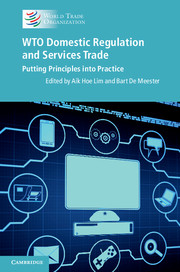Book contents
- Frontmatter
- Contents
- List of contributors
- Foreword
- Disclaimer
- Acknowledgements
- List of abbreviations
- 1 An introduction to domestic regulation and GATS
- Part I Impediments to services trade, regulatory theory and principles
- Part II Legal perspectives on WTO principles and domestic regulations
- Part III Case studies
- Part IV Concluding remarks
- Index
Foreword
Published online by Cambridge University Press: 05 April 2014
- Frontmatter
- Contents
- List of contributors
- Foreword
- Disclaimer
- Acknowledgements
- List of abbreviations
- 1 An introduction to domestic regulation and GATS
- Part I Impediments to services trade, regulatory theory and principles
- Part II Legal perspectives on WTO principles and domestic regulations
- Part III Case studies
- Part IV Concluding remarks
- Index
Summary
Foreword
Domestic regulation of services has a significant impact on the liberalization of trade in services. WTO members have agreed to negotiate a set of disciplines to ensure that such regulations are not unduly burdensome on trade. This book contains analyses and case studies from academics, regulators and trade experts.
Some of the contributions explore the scope or limitations of WTO legal principles to promote domestic regulatory reform. Others provide case studies on how domestic regulation is implemented in practice and the potential trade consequences. The case studies include a discussion of country-specific challenges and experiences in regulating important service sectors, such as finance, telecommunications, distribution, legal services, education, health, postal and logistics services, as well as the role of regulatory impact analysis. The book concludes with some reflections on what needs to be done to address the interface between domestic regulation and trade in services.
The new generation of services trade agreements is increasingly concerned with addressing regulatory issues. By examining the scope and potential ofWTO legal principles against the backdrop of actual regulatory experiences, this book ventures onto new ground. Anyone familiar with WTO negotiations on domestic regulation will certainly appreciate the demand from both trade and regulatory communities for this type of information.
- Type
- Chapter
- Information
- WTO Domestic Regulation and Services TradePutting Principles into Practice, pp. xxPublisher: Cambridge University PressPrint publication year: 2014



